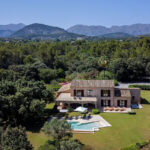Over the past four decades, Phuket has transformed from a relatively unknown holiday destination into a globally recognised luxury resort getaway, often referred to as The Jewel of the Andaman Sea. Phuket enjoys stunning and varied natural scenery, with 30 amazing beaches, a striking green mountain range running north to south, waterfalls, and lush rainforests. However, this incredible evolution is also due to continuous improvements to infrastructure, air connectivity, facilities, and amenities. Phuket now has 16 international schools, several international hospitals, numerous golf courses and shopping centres offering the rare combination of a gorgeous tropical island setting backed up by all modern conveniences.
For more insights on the current trends shaping Phuket’s real estate market, check out our detailed article on Phuket Real Estate Market: A Cash-Based Tourism-Led Evolution
International flights commenced in 1984, and since this time the island has demonstrated remarkable resilience in the face of significant challenges. From the 1997 Asian financial crisis to the 2004 tsunami and the 2008 global financial crisis, the real estate market has emerged stronger each time. Most recently, the market rapidly recovered after Covid, driven by renewed tourism and strong demand from Russian investors seeking stable investment opportunities following the war in Ukraine, recording record property sales figures in 2023.
With first-class infrastructure, excellent air connectivity, and world-class amenities, Phuket is not only an attractive option for holiday homes and investment properties but also a great choice for a permanent or semi-permanent place to live. In this article, we explore five key trends shaping Phuket’s property market at the end of 2024.
Phuket’s Continued Strong Market Growth
Phuket’s property market has consistently defied global trends, achieving record-breaking growth in both 2023 and the first half of 2024. While many property markets struggle to face challenges such as rising interest rates, inflation, and geopolitical tensions, Phuket real estate has continued to thrive, mainly thanks to its flourishing tourism sector, which has historically been, and still remains, the key driver of the island’s property market.
In 2023, according to CBRE (source: Bangkok Post), villa sales quadrupled the annual average, making it a record year, with condominium sales also reaching new heights. This momentum carried into 2024, with the Real Estate Information Centre (REIC) reporting a surge in the supply of both villas and condominiums, driven by foreign investment. By all metrics, the resort villa market stood out, with new supply increasing by nearly 400% compared to the second half of 2023 and villa sales nearly doubling during this period.
The consistent strength of Phuket’s property market is very closely tied to its thriving tourism sector. Unlike other regions in Thailand, where property markets rely more heavily on local demand, Phuket’s real estate success is intrinsically linked to international visitors. Foreign buyers are typically introduced to the market during a vacation, as they experience first-hand the island’s tropical charm, robust infrastructure, and lifestyle offerings. This firsthand exposure often leads to a property purchase, though often years later. Hence, for decades, tourism has been a major catalyst behind sales of villas, houses and condos in Phuket.
Post-Covid, this demand has only intensified, following the reopening of borders and the return of international tourists and an influx of foreign investment. Russian buyers, in particular, have emerged as dominant players in the market, driven by geopolitical tensions and the search for safe investment opportunities. Government initiatives, such as the Long-Term Resident (LTR) Visa, have further enhanced Phuket’s appeal to foreigners seeking long-term stays or relocations. The rise of remote work and digital nomads has also contributed, with families increasingly drawn to Phuket as a semi-permanent or permanent residence.
Phuket’s property market also offers exceptional value compared to similar global resort destinations like Dubai, Marbella, or Ibiza while providing world-class infrastructure, excellent air connectivity, a relatively low cost of living, and cultural diversity. As tourism looks set to continue on an upward trend, the island’s property market is likely to maintain its growth trajectory, reinforcing its position as one of the world’s most attractive resort investment destinations.
Proliferation of Branded Real Estate in Phuket
The branded property sector in Phuket has grown dramatically over recent years, and now the island is one of Asia’s leading destinations for this category of real estate. Branded residences, developed or marketed in collaboration with well-known hospitality or lifestyle brands, offer a distinctive living experience by blending luxury, design, and high-quality management. Phuket’s long-standing reputation as a premier resort destination has naturally attracted international brands, driving a proliferation of branded developments across the island.
The post-COVID era has accelerated this trend, with high-profile projects like The Gardens of Eden, Tri Vananda, and Laguna Lakeside Residences broadening the range of branded properties available. In contrast, Koh Samui has very few branded residences, partly due to its less mature property market and a luxury sector that is still in the process of evolving. By September 2024, Thailand’s branded real estate sector was valued at close to USD 6 billion, according to prominent consultancy C9 Hotelworks, with Phuket accounting for a majority of the country’s market share for these property types.
The growth in branded real estate reflects the island’s shift from a fully tourism-led economy to a more integrated model combining property, hospitality, and lifestyle. Developments such as Laguna Phuket exemplify this transition, evolving from hospitality-focused projects to mixed-use strategies that meet the rising demand for luxury residential investments.
Branded residences in Phuket are now considered Class A properties, with many associated with world-renowned hotel groups or other luxury brands. For example, the Standard Residences in Bang Tao brings global recognition to the area, while Tri Vananda’s collaboration with Clinique La Prairie merges wellness and real estate in an innovative way. These partnerships highlight the unique appeal of branded developments, which combine premium amenities, exceptional management, and brand prestige to create a compelling investment option.
Global trends such as remote work, urban flight, and the rising demand for resort-style living have further fuelled the appeal of branded real estate in Phuket. This evolution has positioned Phuket as a leader in branded property across Asia, rivalled only by global resort centres like Dubai.
New Property Development in Phuket’s Inland Areas
Phuket’s property market has witnessed significant expansion in recent years, with development extending to inland areas that were once untouched or primarily agricultural. Historically, the island’s coastal regions, particularly the Andaman coastline and the southern tip, were the primary focus of development due to their proximity to beaches and captivating sunset views. However, the Central Valley, once home to coconut groves, water buffalo, and rubber plantations, has now emerged as a thriving hub for property development. Entire communities of villas in Phuket are being built in this previously rural area, offering buyers new opportunities to invest in spacious and modern homes.
The spread of property development inland has been driven by several interrelated factors. Firstly, the growing demand for properties in Phuket has made land in prime coastal locations like Bang Tao, Surin, and Kamala increasingly scarce and expensive, pushing developers to seek more affordable land further inland. Inland areas also provide the space needed for eco-friendly and sustainable projects, which are becoming increasingly popular among buyers. These projects often incorporate features such as green spaces, community gardens, and lower-density living, all of which are better suited to the more expansive and cost-effective land available inland. For example, Tri Vananda in Thep Krasatti is a wellness-focused development that spans 237 acres while preserving 85% of its land for tropical landscapes, wetlands, and an organic farm, showcasing the potential for sustainable inland living.
Additionally, Phuket’s excellent infrastructure has made inland living more convenient than ever. The island boasts well-maintained roads, reliable utilities, and modern amenities, ensuring that inland residents remain well-connected to key areas. With Phuket’s compact size – it is only 21 km from east to west – any property is just a short drive from the island’s beaches, shopping centres, and other attractions.
Another factor is the growing demand for homes designed for permanent or semi-permanent living rather than holiday use. Inland developments often cater to families and long-term residents, with a focus on proximity to international schools and more spacious living environments. These features are increasingly prioritised by buyers, especially those relocating to Phuket for work, remote opportunities, or lifestyle reasons, and who value practicality over being right by the coast.
Together, these factors signal the maturing of Phuket’s property market, which is evolving to meet changing buyer preferences and market conditions. Inland developments offer a balance of affordability, sustainability, and convenience, ensuring that residents can enjoy a modern lifestyle while remaining connected to the island’s natural beauty.
Increasing Percentage of Luxury Phuket Villa Buyers from Thailand
Phuket’s luxury villa market, long dominated by foreign buyers, has recently seen a noticeable increase in demand from wealthy Thai investors. While foreign investment continues to account for the majority of luxury villa purchases, this growing interest from Thai buyers is a notable shift in the market. This trend highlights the evolving preferences of high-net-worth individuals in Thailand and their growing recognition of Phuket as a premier location for both investment and residential living.
One of the key turning points was the introduction of the Phuket Sandbox program during the pandemic, which allowed fully vaccinated travellers to visit the island. This initiative not only aided tourism but also familiarised many Thai investors with the Phuket property market. According to Prakaipeth Meechoosarn, head of Phuket property sales at CBRE Thailand, Thai buyers are now increasingly drawn to high-priced residential properties in Phuket, a segment previously dominated by international investors.
Newly launched branded developments have played a pivotal role in this trend. For example, The Standard Residences in Bang Tao, launched in March 2024, has attracted significant interest from Thai buyers. Around 60% of the buyers in this project, which includes 200 hotel rooms and 188 condo units priced from 12 million baht, are Thais purchasing for both personal residence and investment purposes. The development, located near Laguna Phuket, has already achieved 70% sales within months of its launch (source: Bangkok Post).
The ultra-luxury villa sector has also seen growing demand from Thai buyers. In Laguna Phuket, the Banyan Group recently sold three beachfront villas, priced at 250 million baht each, to Thai investors. These sales reflect a shift that began during the pandemic, as many affluent Thais became acquainted with properties such as Banyan Tree Phuket through the Sandbox program. Before the pandemic, the proportion of Thai buyers in the luxury market was much smaller, underscoring the significance of this transformation.
Bangkok Condo Developers Diversify into Phuket
One of the major benefits of Phuket’s property market being driven by foreign investment is that it is largely insulated from the economic downturns affecting the domestic market in Thailand. Hence, with the condominium market in Bangkok slowing down substantially in 2024, both in terms of supply and demand, a number of major Bangkok-based condominium developers have understandably turned their attention to Phuket to diversify their portfolios.
A Slowing Bangkok Condo Market
The Bangkok condominium market has faced significant challenges in 2024, driven by declining purchasing power and stricter lending criteria from financial institutions. Despite government measures, such as reduced mortgage registration fees, the mid-to-low-end condo segment has struggled as buyers face difficulties securing financing. Newly launched condo supply in Bangkok dropped sharply by 71.4% in the third quarter of 2024 compared to the previous quarter, and unsold inventory has continued to accumulate, particularly in suburban areas (source: Bangkok Post). Developers in Bangkok have also had to adjust prices downward in an attempt to clear unsold units, but the overall market remains subdued, particularly in the mass-market segment reliant on local buyers.
Shifting Focus to Phuket
In stark contrast, Phuket’s property market has demonstrated remarkable growth, driven by strong foreign demand and consistent rental yields. Condominium sales on the island surged by 142% year-on-year in the first half of 2024, with 3,000 units sold, nearly triple the pre-pandemic annual average (source: Bangkok Post). This robust performance has drawn the attention of Bangkok developers, eager to tap into Phuket’s buoyant market.
Bangkok-based developers such as Origin Property Plc, AssetWise Plc, and Central Pattana Plc have launched multiple projects in Phuket in recent years. Sansiri Plc, one of the largest players, has been active in Phuket for over a decade, completing 22 projects worth 22.6 billion baht. The company plans to launch 27 additional projects worth 25 billion baht between 2025 and 2029, underscoring its confidence in Phuket’s market potential.
Capstone Asset Co., another Bangkok developer, recently made its debut in Phuket with the Peylaa Phuket Bang Tao project. This high-end development, comprising 408 units valued at 3.4 billion baht, is a testament to the increasing appeal of Phuket’s property market for developers seeking to diversify their portfolios.
In addition to being insulated from domestic economic downturns, another key advantage of the Phuket real estate market being led by tourism is the significant investment it attracts from the Thai government for infrastructure. As tourism on the island continues to expand, its vital contribution to Thailand’s GDP has understandably resulted in a growing and long-term government commitment to infrastructure development in Phuket. High-quality infrastructure, coupled with well-publicised plans by the Thai government for continued investment, further enhances Phuket’s appeal to developers from Bangkok, who are keen to capitalise on its expanding and relatively stable property market.



